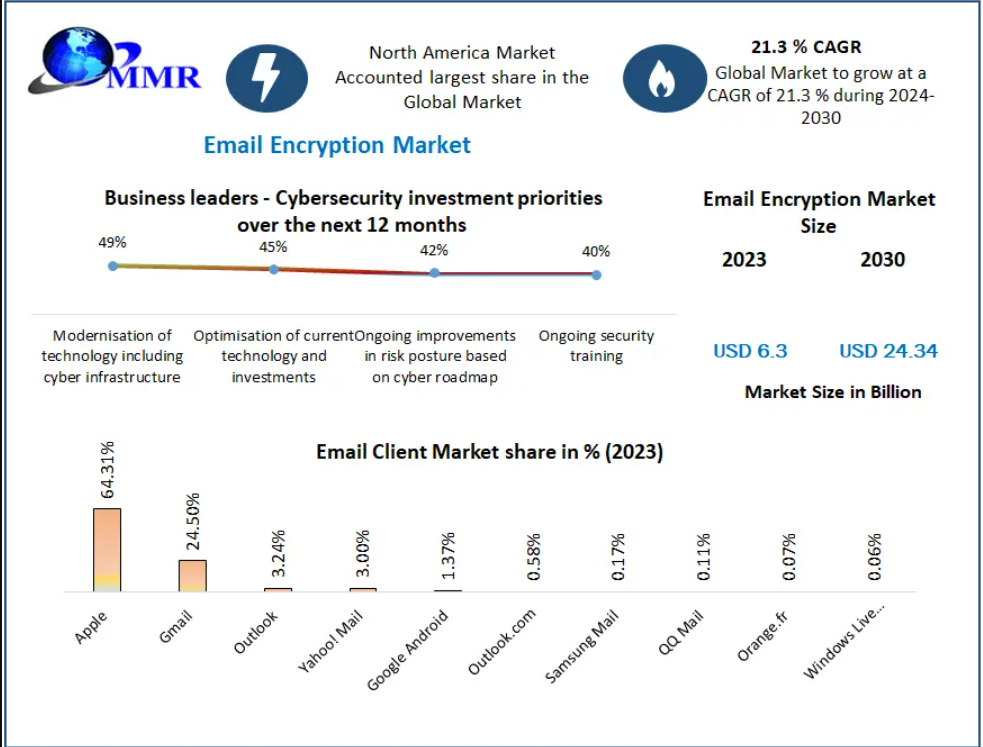Email Encryption Market Set for Strong Growth Amid Rising Cybersecurity Threats 2030

Email Encryption Market 2024–2030: Rising Cyber Threats Propel Security Adoption Across BFSI & Enterprise Sectors
The global Email Encryption Market, valued at USD 6.3 billion in 2023, is projected to expand to USD 24.34 billion by 2030, registering an impressive CAGR of 21.3% during the forecast period. This rapid growth is driven by escalating cybersecurity threats, stringent data protection regulations, the rise of cloud-based email platforms, and increasing enterprise focus on secure communication.
As email remains the primary communication channel for businesses worldwide, the need to protect sensitive corporate and customer information has become essential. Email encryption technologies ensure that only authorized users can access email content, preventing data breaches, unauthorized access, and cyberattacks.
Market Overview
Email encryption involves converting email content into unreadable text using cryptographic algorithms. Only the intended recipient can decrypt and read the message. This prevents cybercriminals, unauthorized users, and malicious actors from intercepting or exploiting sensitive data.
Industries such as BFSI, healthcare, government, legal services, IT & telecom, retail, and manufacturing increasingly rely on email encryption to protect personal, financial, and confidential business data.
The rise of phishing, ransomware, business email compromise (BEC), and identity theft has further accelerated the adoption of end-to-end and gateway email encryption solutions.
To know the most attractive segments, click here for a free sample of the report:https://www.maximizemarketresearch.com/request-sample/28090/
Market Dynamics
- Key Growth Drivers
- Surge in Cyberattacks and Data Breaches
Cyberattacks targeting email systems are increasing in frequency and sophistication:
- Phishing and spear-phishing
- Ransomware attacks
- Business email compromise (BEC)
- Credential theft
- Malware distribution
Email encryption acts as a secure shield, reducing the chances of unauthorized access or interception.
- Strict Data Protection Regulations
Global regulations mandate secure communication practices:
- GDPR – Europe
- HIPAA – Healthcare
- CCPA – California
- PIPEDA – Canada
Organizations must encrypt sensitive data or face fines, penalties, and reputational damage. This regulatory pressure significantly boosts adoption.
- Growing Shift Toward Cloud-Based Email
As enterprises adopt Microsoft 365, Google Workspace, and other cloud email platforms, the demand for cloud-compatible encryption is rising. Cloud email encryption eliminates on-premise infrastructure costs and ensures secure transmission.
- Rising Awareness of Data Privacy
Post high-profile data breaches worldwide, both consumers and enterprises are becoming more privacy-conscious. Email encryption ensures confidentiality, trust, and secure business operations.
- Market Restraints
Interoperability Challenges
Encryption solutions often face compatibility issues with:
- Different email clients
- Third-party applications
- Mobile platforms
- Legacy enterprise systems
This creates communication inefficiencies, limiting seamless encryption adoption.
Complex Key Management
Managing encryption keys for thousands of users is challenging:
- Key generation
- Secure distribution
- Revocation and renewal
- Multi-device management
Key mismanagement can compromise security entirely.
Performance & Scalability Limitations
Encrypting large volumes of email may cause:
- Latency in delivery
- Server overload
- Increased bandwidth usage
- Reduced system performance
Organizations with high email traffic need scalable encryption architectures.
Email Encryption Market Segment Analysis
- By Type
|
Segment |
Insight |
|
End-to-End Email Encryption |
Dominated in 2023 and will continue leading. Ensures the highest security by encrypting content from sender to recipient. |
|
Gateway Email Encryption |
Used for organizations securing outbound email traffic. |
|
Boundary & Hybrid Encryption |
Used by enterprises needing flexible encryption options. |
|
Client Plugins |
Enhance user control but limit scalability in large enterprises. |
End-to-end encryption is preferred for compliance with HIPAA, GDPR, and other regulations.
- By Deployment Mode
On-Premises (Largest Share in 2023)
Chosen by industries requiring maximum control and customized security policies, especially:
- Banks
- Government agencies
- Defense organizations
Cloud Deployment (Fastest Growing)
Preferred by SMEs and digitally transforming enterprises. Offers:
- Lower cost
- Automatic updates
- Fast deployment
- Scalability
Cloud-based email encryption adoption is accelerating with the rise of cloud email platforms.
- By Vertical
Banking, Financial Services & Insurance (BFSI) – Market Leader
BFSI handles extremely sensitive information:
- Customer data
- Financial statements
- Transaction details
- Investment reports
Email encryption prevents identity theft, phishing, and financial fraud.
Other high-growth sectors include:
- Healthcare (HIPAA compliance)
- Government & defense (confidential communication)
- IT & ITeS (IP protection)
- Retail & e-commerce (customer data security)
To know the most attractive segments, click here for a free sample of the report:https://www.maximizemarketresearch.com/request-sample/28090/
Regional Insights
- North America – Market Leader (2023)
North America dominates due to:
- Stringent data protection laws (HIPAA, CCPA, PIPEDA)
- High cyberattack frequency
- Advanced IT infrastructure
- Rapid shift toward cloud email systems
Industries like BFSI, healthcare, government, and enterprise IT heavily invest in email encryption.
Key Companies in the Global Email Encryption Market
North America
- Proofpoint, Inc.
- Symantec Corporation
- Cisco Systems
- Microsoft Corporation
- Barracuda Networks
Europe
- Mimecast
- Egress Software Technologies
- Sophos
- Trend Micro
- Zix Corporation
Asia-Pacific
- Trend Micro Inc.
- Hitachi Systems Security
- Digital Arts Inc.
- ZixiTech
- DataMotion
Latin America
- CipherCloud
- Safe-T Group
- Trend Micro
- Check Point Software Technologies
Middle East & Africa
- Trustwave
- Mimecast
- Digital Guardian
- Avanan
- Check Point Software Technologies
These players focus on product innovation, AI-led threat detection, cloud integration, and encryption automation.
Conclusion
The Email Encryption Market is undergoing rapid transformation driven by:
- Growing cybersecurity risks
- Strict global data protection regulations
- Increasing cloud adoption
- Rising enterprise awareness about privacy
By 2030, demand will be shaped by:
- AI-powered email encryption
- Zero-trust security models
- Cloud-native encryption platforms
- Integration with enterprise collaboration tools
As businesses worldwide continue to prioritize secure communication, email encryption will remain a cornerstone of cybersecurity strategies.
- Sports
- Art
- Causes
- Crafts
- Dance
- Drinks
- Film
- Fitness
- Food
- Giochi
- Gardening
- Health
- Home
- Literature
- Music
- Networking
- Altre informazioni
- Party
- Shopping
- Theater
- Wellness


